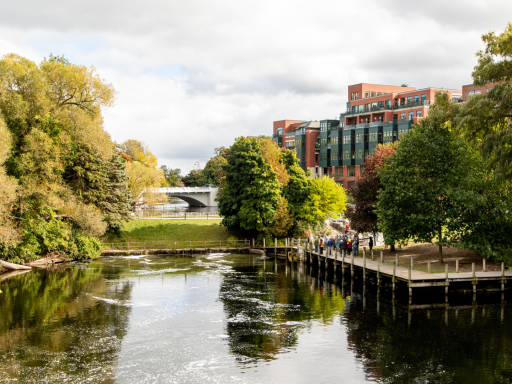Detroit has been named One of the World’s Greatest Places of 2022 by TIME. The city continues to grow and create vibrant and inclusive spaces for people to connect, create and thrive.
TIME’s announcement highlights the city’s economic recovery nearly 10 years after filing for bankruptcy.
Over the years, several CMF members have worked to support the advancement of Detroit through economic and small business initiatives, riverfront restoration and more.
The New Economy Initiative (NEI), a project of the Community Foundation for Southeast Michigan (CFSEM), has worked to support entrepreneurial development throughout Southeast Michigan.
NEI was created in 2007 with a $100 million commitment, and since then NEI has invested more than $120 million in more than 14,000 companies, representing more than 35,000 employees.
“Detroit has always been the comeback city, we’ve always been resilient and we’re getting back to our roots of being business owners and creators and giving the talent that lives in Detroit the resources that they need to succeed,” Wafa Dinaro, executive director of NEI said.
NEIdeas, a program of NEI launched in 2014, provided grants directly to existing small businesses across Detroit. It provided over $500,000 in direct grants to over 36 small businesses and an entry point for all 600 businesses who applied to access the growing network of available small-business services NEI had been supporting.
“All of the businesses that have come out of NEIdeas have been very successful. Early on in their business development, they were able to get the resources, support and education needed to build a strong foundation for their businesses,” Dinaro said.
Dinaro shared that NEI was intended to only be around for a few years but because of its success over the years, its funders have continued to invest in the program.
“It’s more important now than ever to continue to invest in small businesses and in the City of Detroit,” Dinaro said.
When Detroit filed for bankruptcy in 2013, a coalition of funders, including CMF members, the Detroit Institute of Arts (DIA) donors and the State of Michigan committed a total of $816 million to help support the city, known as the Grand Bargain.
Several CMF members, including CFSEM, Ford Foundation, The Skillman Foundation, Charles Stewart Mott Foundation, W.K. Kellogg Foundation, McGregor Fund, Fred A. and Barbara M. Erb Family Foundation, Hudson-Webber Foundation, John S. and James L. Knight Foundation and Kresge Foundation, were vital in helping to create the Grand Bargain, which safeguarded retiree pensions and DIA artwork and supported Detroit in emerging from bankruptcy.
Detroit’s bankruptcy prompted some CMF members to shift their responses and strategies to support the city.
The Skillman Foundation’s Good Neighborhoods Initiative (GNI), a decade-long investment in six neighborhoods in Detroit launched in 2006, committed $100 million to direct a majority of the foundation’s grantmaking toward an intensive focus on changing the conditions where, at the time, one-third of Detroit’s children lived.
According to a recent report from The Skillman Foundation, the initiative's approach shifted in response to the national recession and Detroit’s bankruptcy filing. The foundation reallocated resources with a deeper commitment to the neighborhoods with the greatest potential for impact.
Marie Colombo, director of strategic evaluation and learning at Skillman, shared in the report that the foundation sharpened its overall intent, focusing on high school graduation rates in the six target neighborhoods.
Through this work, graduation rates in the high schools serving the six neighborhoods went from 65 percent in 2008 to 82 percent in 2015. There are now many functioning resident-leadership groups in the neighborhoods, and more residents are running for or being elected to public office.
Michigan philanthropy has been instrumental in supporting revitalizing public spaces in Detroit, including the riverfront.
As CMF reported earlier this year, construction is underway on the Ralph C. Wilson, Jr. Centennial Park, a 22-acre park located on Detroit’s West Riverfront and supported by CMF members the Ralph C. Wilson, Jr. Foundation, William Davidson Foundation and DTE Energy Foundation.
Ralph Wilson Park, a $75 million investment for the community, will dramatically transform the Detroit Riverfront into one of the most beautiful public spaces in the country. The park will be completed in 2024.
Dinaro shared that although it’s great that Detroit is being recognized this way, there’s still work to be done.
“There are still areas of the city where we need to put more resources in to support residents in growing their businesses. We’re thrilled that we’re making progress, and we want to be known as the place where if you have an idea, you can come here and have access to the resources to create your business,” Dinaro said.
Want more?
Learn more about Detroit being named One of the World’s Greatest Places of 2022.
Learn more about the New Economy Initiative.
Read more about the Grand Bargain.
Learn more about the Good Neighborhoods Initiative.
